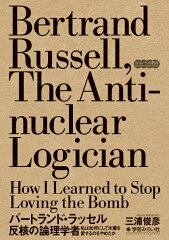バートランド・ラッセル「常識と核戦争 原水爆戦争はいかにして防ぐか」序文
* 出典:バートランド・ラッセル(著),飯島宗亨(訳)『常識と核戦争-原水爆戦争はいかにして防ぐか』(理想社,1959年5月 138pp.)* 原著: Common Sense and Nuclear Warfare, 1959
この核戦争の問題が、権力政治の長年来の争いにすっかりまきこまれてしまったことは、じつに深い不幸です。こうした権力政治の争いは、ひどく悪意をおび、ひどく激越なので、明瞭しごくの事態さえも分別できないように、およそ物事を分別する力を失わせてしまうものです。もし私たちが、核兵器によっておこった新たな諸問題について、賢明に思いをめぐらすことをすべきであるならば、私たちは事の全体を、まったくちがった見かたで見ることを学ばなければなりません。それは、なんらかの新らしい伝染病がそんなふうに見られるように、一致した行動で立ちむかわなければならないひとつの共通の危険として見られなければなりません。
|
|
もうひとつ、もっと適切だと思われる例をあげてみましょう。14世紀に、黒死病が東半球一帯に荒れまわったことがあります。西ヨーロッパでは、そのために住民の約半数がいのちを失い、たぶん東ヨーロッパやアジアでも、ほぼ同じくらい荒らしまわったと思います。その当時は、この伝染病と戦うのに必要な科学的知識がまだありませんでした。こんにちなら、もしもそのような禍害の脅威があれば、すべての文明国人が一致協力して、その禍いと戦うでありましょう。「このペストという悪疫は、たぶん、われわれよりもわれわれの敵の方をよけいに害するだろう」などという議論をする人は、ひとりもいないでしょう。そんな議論をする人がいたら、非人間的な怪物だと考えられるでしょう。しかも、黒死病も、またそれに類するどんな悪疫も、核戦争の危険がもちだしてくるほどの戦慄すべき脅威をもちだしたことは、いまだかつてないのです。ナトー(NATO)の国々も、ワルシャワ条約の国々も、そのどちらにもくみしない国々も、この問題に関しては、まさにまったく同じ利害関係をもっています。それは、実際、新たな黒死病と戦うときにそれらの国々がもつのと同じ利害関係なのです。もしこのことが東西の政治家たちや住民たちによって理解されたなら、いまは克服しがたく見える、あるいはそれに近いものと見える数多くの困難が、消えてなくなるでありましょう。私がこう申しますのは、もちろん、私がここで提唱している観点が、両陣営からひとしく採用されるばあいを想像しての話です。問題がどういう意味をふくんでいるかを、気をおちつけて、まともに考慮してみるならば、核兵器の諸問題に関してこうして協調することは、不可避的に出てくることでしょう。理想主義的な動機をいろいろあげて、それに訴えることは、有効なはたらきをすることもありうるでしょうが、かならずしも必要なことではないでしょう。必要なことといえば、国民的な利己心という動機に訴えさえすればそれですむでしょう。
It is surprising and somewhat disappointing that movements aiming at the prevention of nuclear war are regarded throughout the West as Left-Wing movements or as inspired by some -ism which is repugnant to a majority of ordinary people. It is not in this way that opposition to nuclear warfare should be conceived. It should be conceived rather on the analogy of sanitary measures against epidemics. The peril involved in nuclear war is one which affects all mankind and one, therefore, in which the interests of all mankind are at one. Those who wish to prevent the catastrophe which would result from a large-scale H-bomb war are not concerned to advocate the interests of this or that nation, or this or that class, or this or that continent. Their arguments have nothing whatever to do with the merits or demerits of Communism or Democracy. The arguments that should be employed in a campaign against nuclear weapons are such as should appeal, with equal force, to Eastern and Western blocs and also to uncommitted nations, since they are concerned solely with the welfare of the human species as a whole and not with any special advantages to this or that group.
It is a profound misfortune that the whole question of nuclear warfare has become entangled in the age-old conflicts of power politics. These conflicts are so virulent and so passionate that they produce a widespread inability to understand even very obvious matters. If we are to think wisely about the new problems raised by nuclear weapons, we must learn to view the whole matter in a quite different way. It must be viewed, as some new epidemic would be viewed, as a common peril to be met by concerted action.
Let us take an illustration. Suppose that a sudden outbreak of rabies occurred among the dogs of Berlin. Does anybody doubt that Eastern and Western authorities in that city would instantly combine to find measures of extirpating the mad dogs? I do not think that either side would argue: 'Let us let the dogs lose in the hope that they will bite more of our enemies than of our friends; or, if they are not to be let completely loose, let them be muzzled with easily detachable muzzles and paraded on leashes through the streets so that, if at any moment the 'enemy' should let loose its mad dogs, instant retaliation would follow.' Would the authorities of East or West Berlin argue that 'the other side' could not be trusted to ack kill its mad dogs and that, therefore, 'our side' must keep up the supply as a deterrent? All this is fantastically absurd and would obviously not occur to anybody as a sane policy, because mad dogs are not regarded as a decisive force in power politics. Unfortunately, nuclear weapons are regarded, quite mistakenly, as capable of securing victory in war; and because they are so regarded, few men think of them in a manner consonant with sanity or common sense.
Let us take a, perhaps, more apt illustration. In the fourteenth century the Black Death swept over the Eastern hemisphere. In Western Europe it destroyed about half the population, and in all likelihood it was about equally destructive in Eastern Europe and in Asia. In those days, there did not exist the scientific knowledge necessary to combat the epidemic. In our day, if there were a threat of such a disaster, all civilized nations would combine to combat it. No one would argue, 'Perhaps this pestilence will do more harm to our enemies than to us'. Anybody who did so argue would be considered a monster of inhumanity. And yet neither the Black Death nor any similar pestilence has ever offered as terrible a threat as if is offered by the danger of nuclear war. The countries of NATO, the countries of the Warsaw Pact, and the uncommitted countries have precisely the same interest in this question. The same interest, in fact, as they would have in combating a new Black Death. If this were n realized by the statesmen and populations of East and West, many difficulties which now seem insuperable, or nearly so, would disappear. I am, of course, supposing that the point of view which I am advocating would be adopted by both sides equally. Given a sane and sober consideration of what is involved, this harmony on the problems of nuclear weapons would inevitably result. It a would not be necessary to invoke idealistic motives, although they could be validly invoked. It would be necessary only to appeal to motives of national self-interest.


